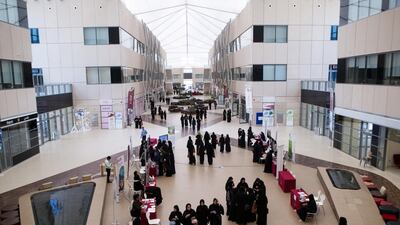Many countries continue to recognise the significant role of education as a driver of change. However, despite enormous investment, both financial and human, the UAE’s education system continues to exhibit more challenges than solutions as it attempts to increase its return on investment.
My 2012 doctoral research identified social factors at home, in the community and at school that prevented young Emirati school leavers from achieving their potential in further education. In general, the research finds very few examples that support learning as a process of a teacher leading forth, drawing out knowledge and strengthening learners. Much of this is due to poor learning experiences described as teacher-centric and intimidatory that produce disengaged learners.
Though very good universities in the West have recently begun reporting a lack of preparedness and ability among students, none exhibit the challenge awaiting young Emirati school leavers as they contemplate four to six years of higher education using their second language of English.
Today only 20 per cent of Emirati higher education applicants are eligible to directly commence their studies without an academic bridge programme to raise their competence in English and mathematics, readiness for university-level work. Some Emirati students find the experience to be linguistically, cognitively, emotionally and psychologically overwhelming. As working adults, they continue to view lifelong learning and applied skills training through the negative emotional lens of their high school and early university experiences.
There is another way.
A definition of being human is the recognition of understanding the meaning of our experience, first expounded by Jack Mezirow in the 1990s. Trainers, lecturers and teachers have changed the way they teach by encouraging learners to make their own interpretations rather than to passively adopt the beliefs and paradigms of others.
At the heart of transformative learning is perspective transformation, sometimes the result of a disorientating life crisis or dilemma. Transformation may also occur less dramatically by a teacher over a longer period of time.
Implementing a combination of approaches that include perspective change, emotional connection and warm demandingness, I have addressed undoing the damage done to the adult learners through their high school experiences. This type of instruction requires risks, exposing both the instructor and the learner to a level of vulnerability as current tightly-held attitudes, beliefs and assumptions are presented, examined and challenged.
There is also a space here for dialectical thinking and its focus on process and change brought about by the clash of opposing ideas. Changing one’s perspective does not necessarily lead to the current perspective or belief being replaced.
The entwined nature of the Arabic language, Arab ethnic identity and the religion of Islam was revealed in a recent study of the impact upon female Emirati university students and their learning experiences of using English as the main language of instruction. A quarter of the students said they believed that the current status of English presents a potential threat to both the culture and traditions of the UAE, as well as the Islamic principles of the country, while 30 per cent felt that learning at university through English makes them more westernised.
Further, as knowledge continues to expand, who decides what is to be taught to the next generation?
I am highly critical of modern school systems especially in developing nations that have ignored local values, practices and relationships, the result of knowledge and wisdom developed over many generations.
Largely based upon western practices and values, modern education in these cases appears like a Trojan Horse, devaluing local knowledge in favour of acceptable and standardised international knowledge based upon TIMSS and Pisa global assessments.
This has created a cultural gap between schooling and the community, the distance ever widening between the school discourse and everyday culture of the people and communities where the schools are located.
Not surprisingly, this gap explains many of the problems facing Emirati youth today – non-participation, weak learning, skills mismatch, youth unemployment and a sense of disenfranchisement.
Transformative education links education (content) more closely with societal knowledge and wisdom (context) embedded with strong themes of sustainable development.
The task now is to ask the older generations of Emiratis what aspects of their culture they value and to pass that on to the next generation. This information could then be embedded throughout the curriculum to assist learners in understanding both the content and the context. It would also serve to provide a local knowledge basis for values and moral education announced earlier in the year.In this way, young Emiratis will grow up with a deep respect and knowledge of their culture and of the fortitude of previous generations, hopefully feeling more secure in an ever-confusing and rapidly changing world.
Dr Peter J Hatherley-Greene is director of learning at Emarise in Dubai

